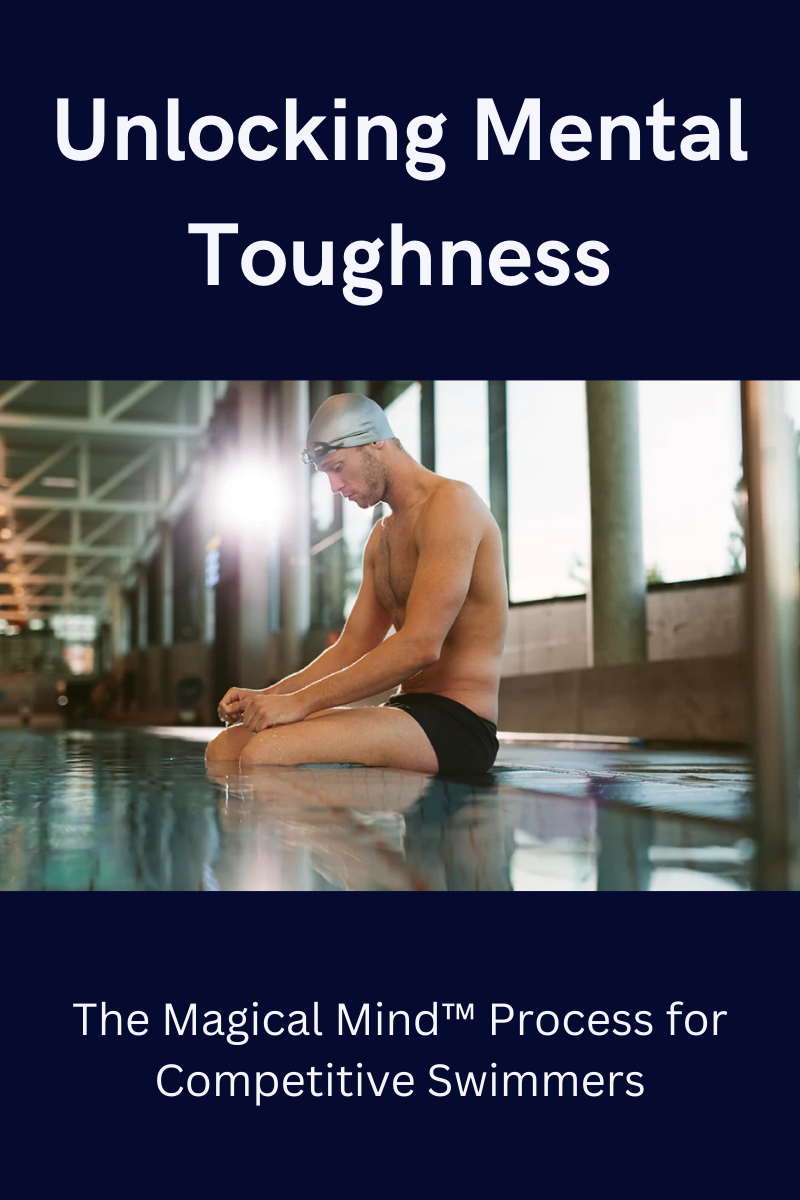Unlocking Mental Toughness: The Magical Mind™ Process for Competitive Swimmers

Unlocking mental toughness is a big part of swimming success, even if it doesn’t always get the attention it deserves. Most people focus on physical training: laps, drills, and technique. But the mind is just as important.
A swimmer needs to stay calm, focused, and strong inside, especially during big races. If their mind isn’t ready, it’s easy to feel nervous, lose focus, or give up too soon.
The Magical Mind Process™ helps swimmers train their minds, not just their bodies. It looks at three parts of the mind: the unconscious, the self-conscious, and the superconscious. This method helps swimmers become more focused, confident, and clear about what they want to achieve.
Parents and coaches have an important role too. By guiding swimmers through these steps, they can support not just faster swimming, but stronger, more balanced young athletes. Unlocking mental toughness doesn’t just help in the pool; it helps in school, life, and everything in between. When swimmers learn how to manage their thoughts and emotions, they unlock their full potential. And that’s the real secret to long-term success.
Awareness of Thoughts: The Foundation of Mental Toughness
Awareness of thoughts is the first step in unlocking mental toughness. Many swimmers have negative thoughts like fear, worry, or self-doubt before a race. These thoughts can make them feel nervous or unsure, even if they trained hard. If swimmers don’t learn how to notice and manage these thoughts, it can hurt their performance.
Teaching swimmers to simply notice their thoughts, without feeling bad or judging themselves—is the beginning of mental strength. This helps them stay calm and focused, even under pressure.
Parents and coaches can support this by using simple tools. One helpful idea is keeping a training journal. Swimmers can write down what they think and feel during practice and races. This helps them see patterns and learn how their thoughts affect how they swim.
For younger swimmers, just talking about their thoughts can help. Ask questions like, “What were you thinking before the race?” or “How did you feel in the water?” This opens the door to honest conversations. Being aware of thoughts is a small step with big impact. It helps swimmers feel more in control and is the key to unlocking mental toughness in the pool and beyond.
Intentional Reframing: Shifting the Narrative
Intentional reframing is the next big step in unlocking mental toughness. After swimmers learn to notice their thoughts, they can start changing the negative ones into helpful, positive thoughts. For example, if a swimmer thinks, “I’m going to mess this up,” they can learn to say, “I’ve trained hard. I’m ready.” This small change builds confidence and helps them stay calm and focused during races.
One helpful tool is visualization. Swimmers can close their eyes and imagine swimming a great race, feeling strong, smooth, and confident from start to finish. Doing this often helps the brain feel ready, even before they get in the water.
Coaches can guide these visualizations during practice. Parents can help too, by encouraging swimmers to say positive affirmations. Simple phrases like “I am strong” or “I can do this” can make a big difference before a race.
These small mental habits help swimmers shift their thinking and feel better prepared for pressure. Over time, intentional reframing builds belief and strength from within. It’s a key part of unlocking mental toughness, and becoming not just a better swimmer, but a stronger person.
Connecting with the Higher Self: Finding Purpose and Intuition
Connecting with the higher self is the third step in unlocking mental toughness. Swimming is not just about the body; it’s also about the heart and mind. When swimmers feel connected to their purpose, they stay stronger, even during hard times.
This step is about helping swimmers listen to their inner voice. It’s that quiet feeling that reminds them why they swim and what they love about it. This helps them stay motivated when training feels tough or when races don’t go as planned.
Coaches can help by using simple tools like deep breathing or short meditations during practice. These quiet moments help swimmers feel calm and think more clearly. Swimmers can ask themselves, “Why do I swim?” or “What do I enjoy most about it?”
Parents also play a big role. They can talk with their child about their journey and celebrate their effort, not just results. When swimmers feel valued for who they are, they grow in confidence and purpose. This deep connection helps swimmers feel strong inside, and that is key to unlocking mental toughness for life, both in and out of the pool.
Integration Through Practice: Building Mental Habits
Integration through practice is the final step in unlocking mental toughness. Just like swimmers repeat drills to get faster, they need to repeat mental training to get stronger inside.
Mental habits take time to grow. When swimmers practice mindset tools every day, they start to feel more focused and calm. Over time, these habits become natural. This helps them stay confident during hard sets and perform better during races.
Coaches can help by adding small mental training exercises into practice. A few quiet breaths at the start or a short talk about what went well at the end can make a big difference. Parents can support this at home. Encourage your swimmer to set simple mental goals, just like physical ones. For example, they can focus on saying something positive to themselves during a tough set or staying calm at a big meet.
When swimmers combine physical and mental practice every day, they build true strength. This kind of training helps them handle pressure, bounce back from mistakes, and swim with confidence. That’s what unlocking mental toughness is all about; growing stronger inside and out, one day at a time.
Reflection and Adjustment: Continuous Growth
Reflection and adjustment is the final step in unlocking mental toughness. After each swim meet, it’s important to look back and learn, not just from the physical race, but from the mental side too.
Swimmers grow stronger when they understand what worked and what didn’t. Maybe a mental strategy helped them stay calm, or maybe nerves got in the way. Reflecting on these moments helps them improve next time.
Parents and coaches can guide this reflection in a kind and helpful way. Ask simple, open questions like, “What part of the race made you feel strong?” or “What helped you stay focused today?” These questions help swimmers think about their mindset and feel supported.
For younger swimmers, make it a fun talk, not a serious review. Keep it positive and encouraging. Coaches can also give gentle feedback, helping swimmers see how their mental work affected their race. This kind of reflection leads to growth. When swimmers adjust their mindset after each experience, they become more prepared, more confident, and more resilient. That’s how we finish the journey of unlocking mental toughness, by learning, growing, and always moving forward.
Why Mental Training Matters for Swimmers?
It’s because swimming is not just physical; it’s a mental game too. A swimmer may have great strokes and strong muscles, but if their mind isn’t ready, it’s hard to do their best under pressure.
The difference between a good swimmer and a great one often comes down to mindset. Swimmers who focus on unlocking mental toughness can stay calm, focused, and strong, especially during tough races or when things don’t go as planned.
The Magical Mind Process™ helps swimmers grow in five steps: becoming aware of their thoughts, learning to reframe them, connecting with their purpose, building habits through daily practice, and reflecting after races. These steps teach swimmers how to stay positive, manage stress, and keep going, even when training gets hard.
Parents and coaches play a big role in this. By supporting mental training, they’re helping swimmers not just in the pool, but in life. These tools build confidence, focus, and resilience. Mental strength matters. It’s what helps swimmers rise above fear, stay strong under pressure, and unlock their full potential. That’s why mental training is just as important as physical training.
Are You Ready to Unlock Mental Toughness with Your Swimmer?
The Magical Mind Process is a simple and powerful way to help swimmers grow stronger on the inside. It gives them the tools they need to stay calm, focused, and confident, especially during tough races and training days. By following this process step by step, swimmers can turn hard moments into learning moments and move forward with a clear purpose.
Parents and coaches are a big part of this journey. With their support, swimmers can practice these mental tools every day and feel proud of their growth. Together, we can help swimmers not only do better in the pool but also feel stronger in life.
If you’re ready to help your swimmer start unlocking mental toughness, we’re here to guide you. Contact us today to schedule a discovery call. Let’s work together to support your swimmer’s mind and help them reach their full potential, with strength, belief, and joy.
